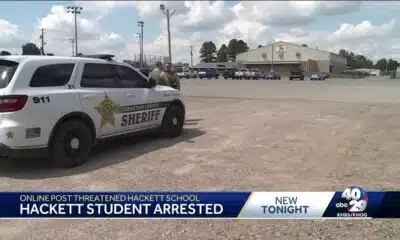News from the South - North Carolina News Feed
Soccer stadium development was in works months before UNCA acknowledged it, business records show • Asheville Watchdog
The prospective developer for a 5,000-seat soccer stadium and surrounding development on the University of North Carolina-Asheville’s campus was created months before the university publicly acknowledged its intent to develop 45 acres of wooded land, state business records show.
Asheville Stadium District Real Estate Project LLC registered to do business in North Carolina on Nov. 27, according to filings with the office of the North Carolina Secretary of State.
That was about six weeks before UNCA, without announcement, began assessing the development potential of the acreage, and nearly seven months before it proposed the project: A stadium for Asheville City Soccer Club matches and other events, surrounded by parking lots, market-rate housing and retail units. In the interim, UNCA officials repeatedly said they’d made no decisions about how to develop the woods, which have long been embraced by students, faculty and neighbors for both recreation and research.
“That’s a bold-faced lie on their part, because they claimed they didn’t know anything, and they obviously did,” said Callie Warner, an advocate for the preservation of the woods.
Neither UNCA nor Asheville City SC responded to questions about how and when the development plan came together.
UNCA announced the stadium proposal June 13, and Chancellor Kimberly van Noort said then that the school was working with a private developer. But the university withheld its identity for nearly a month, despite multiple requests from Asheville Watchdog, before naming it during a closed-door presentation to Board of Trustees members last week.

The university’s partner on the project, Asheville City SC, also declined last month to identify the developer. The Asheville Citizen-Times first reported the identity of the developer Monday, along with the news that the Board of Trustees had given approval on a ground lease key to the development plan after nearly two hours of private deliberation.
State records list one manager for Asheville Stadium District Real Estate Project: Mark McCullers, an Ohio-based sports real-estate consultant with a history of working on soccer stadiums. He did not respond to requests for comment for this story.
McCullers spent more than 15 years as an executive with Major League Soccer’s Columbus Crew: He joined the club in 1998 to oversee the construction of its stadium and later became its general manager, then president, before leaving in 2014.
He then founded the McCullers Group, which has been involved in the development of stadiums for FC Cincinnati — a key part of the club’s transition from the United Soccer League to the top-tier MLS — and in Mauldin, South Carolina, where a new stadium for Greenville’s pro teams is set to open next year. The McCullers Group also has a long-term relationship with the USL, the umbrella organization that covers many of the secondary and tertiary soccer leagues in the U.S., including the leagues that Asheville City SC’s teams play in.
But McCullers’s involvement in Asheville raises new questions about the university’s transparency and honesty, critics of the stadium proposal said.
“At each stage in this process, the university has chosen to be evasive, opaque and just plain dishonest,” Woody Davis, another woods advocate, told Buncombe County commissioners Tuesday night. “By all appearances, the decision was made about what they wanted to do no later than November of last year. They have spent the intervening months publicly lying about it while working to push it through behind closed doors.”
Critics of plan have decried lack of transparency
The developer’s business registration in November adds one definitive point to a timeline that has long lacked clarity.
UNCA and Asheville City SC have a yearslong relationship: The club has played its games at UNCA’s Greenwood Field since 2023, when renovations to its previous home, Memorial Stadium, made the field unsuitable. But neither party has said when they began discussing the possibility of working together toward a new stadium.
“I can’t help you,” Roger Aiken, the chair of the university’s Board of Trustees, said Tuesday. “I don’t know anything about when the timeline was.”

In January, neighbors of the woods — which connect the main campus to the Five Points area — were surprised to find heavy machinery boring soil and clearing vegetation. Their outrage prompted a Jan. 16 statement from UNCA, which said that “no decisions regarding development have been made at this time” and promised a “commitment to transparency and collaboration.” In March, van Noort wrote in a Citizen-Times op-ed that the university had decided to develop the woods but maintained that it had not settled on any specifics. Aiken told The Watchdog the same thing later that month.
Also in March, John Dougherty, UNCA’s general counsel and chief of staff, responded to a Watchdog public records request, filed the previous month, for documents related to the development assessment. He provided agreements, dating to as early as December 2024, for boundary surveying on the property. But he said no other documents existed: There were no site plans, no contracts with the companies that had drilled soil and cleared undergrowth, no development agreements between UNCA or the UNC System and outside parties.
The promise that no decisions had been made underpinned a series of community-input sessions the university offered in April, for students, faculty and staff, and the general public. At the latter, attended by reporters, UNCA leaders — including van Noort and Aiken — listened as attendees unanimously criticized how the school had handled its exploration of development. Already, rumors about a soccer stadium were swirling, as at least one speaker noted. Afterward, van Noort declined to take questions from the media.
The university was publicly silent on the matter until June, when van Noort laid out the $200 million stadium proposal in a presentation to members of the UNC System’s Board of Governors.
Van Noort and some Board of Governors members have described the plan as a boon for a school that, in recent years, has struggled with its budget and enrollment. It would sit on what the state has designated as a Millennial Campus property, which gives schools more flexibility to enter into revenue-generating public-private partnerships.
The school has said the developer would foot most of the cost; in return, the developer would design, build and operate the whole development and own the retail, housing and parking. The school also intends to seek $29 million in public subsidies, though it has not said how it plans to do so.
UNCA has yet to fulfil a June 16 records request from The Watchdog for documents that would illuminate the plans and how they came together, including planning documents, communications between university and Asheville City SC officials, and economic development analyses (the school has claimed the development would generate hundreds of millions of dollars in investments, create hundreds of new jobs and bolster sales tax revenue).
The possibility that planning began as early as November is shocking, especially given that the university and its neighbors were still reeling from Tropical Storm Helene, said Chris Cotteta, president of the Five Points Neighborhood Association.
“Where were we all in November?” he said. “We still didn’t have clean drinking water coming out of the tap. We were still clearing trees from the roadways. And meanwhile UNCA is planning this massive stadium development.”
Speaking to county commissioners Tuesday, Davis framed the revelation as a failure of transparency.
“A public institution, founded with public money and situated on public land, now treats the public it is supposed to serve with contempt,” he said. “Many are feeling bewildered and betrayed.”
Asheville Watchdog welcomes thoughtful reader comments about this story, which has been republished on our Facebook page. Please submit your comments there.
Asheville Watchdog is a nonprofit news team producing stories that matter to Asheville and Buncombe County. Jack Evans is an investigative reporter who previously worked at the Tampa Bay Times. You can reach him via email at jevans@avlwatchdog.org. The Watchdog’s reporting is made possible by donations from the community. To show your support for this vital public service go to avlwatchdog.org/support-our-publication/.
Related
The post Soccer stadium development was in works months before UNCA acknowledged it, business records show • Asheville Watchdog appeared first on avlwatchdog.org
Note: The following A.I. based commentary is not part of the original article, reproduced above, but is offered in the hopes that it will promote greater media literacy and critical thinking, by making any potential bias more visible to the reader –Staff Editor.
Political Bias Rating: Center-Left
This content focuses on government transparency and environmental preservation, highlighting criticisms of a public university’s decision-making process regarding development on public land. The framing is skeptical of institutional opacity and questions the influence of private developers on public resources, themes commonly emphasized by center-left perspectives. While not overtly ideological, the emphasis on accountability, community interest, and environmental stewardship aligns with a center-left bias, critiquing establishment actions from a standpoint that values public engagement and cautious development.
News from the South - North Carolina News Feed
How school bus drivers and police use AI to stop vehicle violations
SUMMARY: As the school year begins, Bus Patrol uses AI-powered cameras on over 40,000 school buses across 22 states to catch drivers illegally passing stopped buses, endangering children. In Pennsylvania’s Lower Merion School District, all 135 buses are equipped with these cameras, which activate when the stop arm extends. Drivers frequently ignore the stop sign, with violations occurring multiple times daily. Recorded violations are reviewed by police, leading to fines up to $300 for first offenses. Since installation, nearby districts have issued thousands of tickets. The system enhances enforcement, aiming to protect children by encouraging drivers to stop safely at school buses.
Transportation Correspondent Gio Benitez is in a school district outside Philadelphia that’s using the technology to help crack …
News from the South - North Carolina News Feed
In NC, Black communities meet mental health needs of youth in barbershops and churches
SUMMARY: Reggie Winston, a Raleigh barber trained in mental health first aid and suicide prevention, uses his barber chair as a safe space for Black youth to discuss mental health. Having battled undiagnosed depression himself, Winston founded Grooming Resources and Opportunities, training barbers to recognize signs of distress and suicide risk. North Carolina has launched a Black Youth Suicide Prevention Action Plan focusing on community-led support in trusted spaces like barbershops and churches. With rising suicide rates among Black youth, especially LGBTQ individuals, efforts include training barbers and faith leaders, improving cultural competence in crisis lines, and youth-led awareness campaigns to build trust and save lives.
The post In NC, Black communities meet mental health needs of youth in barbershops and churches appeared first on ncnewsline.com
News from the South - North Carolina News Feed
Biologists are using drones to scare wolves away from cattle
SUMMARY: Biologists and the Agriculture Department are using drones equipped with thermal cameras to protect cattle from wolves. The drones detect wolves near livestock and scare them away by playing sounds through loudspeakers, including fireworks, gunshots, rock songs, and most effectively, human voices like yelling or movie clips. Gray wolves, once nearly extinct, have rebounded in the U.S., posing challenges for ranchers as wolves target easier prey like cattle. Ranchers appreciate the drone technology, but worry wolves may eventually ignore the deterrents. So far, the drones have successfully reduced cattle deaths in Oregon and California.
A team of biologists working near the California-Oregon border is using drones to blast AC/DC’s “Thunderstruck,” movie clips and live human voices to shoo wolves away from cattle in an ongoing experiment.
https://abc11.com/
Download: https://abc11.com/apps/
Like us on Facebook: https://www.facebook.com/ABC11/
Instagram: https://www.instagram.com/abc11_wtvd/
Threads: https://www.threads.net/@abc11_wtvd
TIKTOK: https://www.tiktok.com/@abc11_eyewitnessnews
-
Mississippi Today3 days ago
DEI, campus culture wars spark early battle between likely GOP rivals for governor in Mississippi
-
News from the South - North Carolina News Feed6 days ago
Parasocial party: Why people are excited for the Taylor Swift, Travis Kelce engagement
-
News from the South - Louisiana News Feed6 days ago
K+20: Katrina alters local health care landscape, though underlying ills still the same
-
Our Mississippi Home7 days ago
The Great Backyard Recovery – Helping Birds After the Storm
-
Local News5 days ago
Police say Minneapolis church shooter was filled with hatred and admired mass killers
-
Local News Video5 days ago
08/29 Ryan's “Wet End to the Week” Friday Forecast
-
The Center Square7 days ago
U-M Health ends transgender treatment for minors | Michigan
-
News from the South - Alabama News Feed7 days ago
Katrina displaced 1.5M across the South, only 61% returned to New Orleans | Louisiana










































